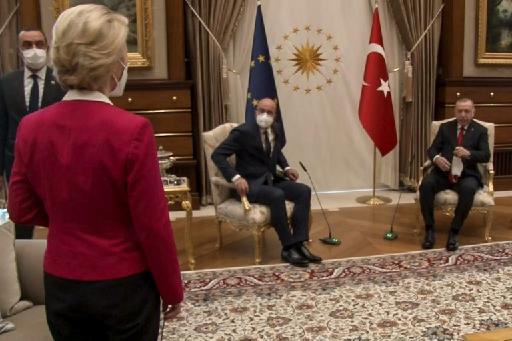Belgium's Foreign Minister Sophie Wilmès defended European Council President Charles Michel in the "Sofagate" controversy that arose when Commission President Ursula von der Leyen was not offered a chair during a meeting with Turkish President Recep Tayyip Erdoğan.
Videos of the meeting show how Michel and Erdoğan already sat down next to each other, while von der Leyen visibly hesitates, before taking a seat on a sofa a little further away.
"Ehm" is the new term for "that’s not how EU-Turkey relationship should be". #GiveHerASeat #EU #Turkey #womensrights pic.twitter.com/vGVFutDu0S
— Sergey Lagodinsky (@SLagodinsky) April 6, 2021
In response to criticism aimed at Michel for not reacting, Wilmès tweeted that "the fight for gender equality is far from being won everywhere in the world. It must remain at the heart of our foreign, Belgian and European policy. I have known Charles Michel for many years and he is a strong advocate."
Le combat pour l’égalité femmes-hommes est très loin d’être gagné partout dans le monde. Il doit rester au cœur de notre politique étrangère, belge et européenne. Je connais @CharlesMichel depuis de nombreuses années, il en est un ardent défenseur. #ConventionDIstanbul
— Sophie Wilmès (@Sophie_Wilmes) April 7, 2021
Wilmès, who was Belgium's first female Prime Minister, was chosen by Michel to succeed him as prime minister when he took over as European Council president.
On Thursday, the major political groups in the European Parliament deplored the image of disunity given by the presidents of the institutions during the meeting in Ankara and asked them to come and explain themselves in plenary.
"The meeting in Ankara of Presidents von der Leyen and Michel should have sent a message of firmness and unity in the European approach to Turkey," said German MEP Manfred Weber, chairman of the EPP Group (pro-European right).
"Unfortunately, it turned out to be a symbol of disunity, as the presidents failed to stand together when necessary. We expect more from Europe's foreign policy," he added, calling for a debate in plenary.
The chair of the Socialists and Democrats group, Iratxe Garcia Perez of Spain, also called for a hearing of the presidents of the two institutions "to clarify what happened" and to see "how to ensure respect for the European institutions."
The images of the meeting in Ankara "hurt" and show "something organised," said the French Secretary of State for European Affairs Clément Beaune.
"I do not want a naive, fragile Europe. We are dealing with interlocutors, such as the Turkish president, who know the power of images, the value of symbols. We must be much firmer," he said.
On Wednesday, Ursula von der Leyen expressed her dissatisfaction at having been placed in the background and demanded to be treated as the Council President's equal.
Later the same day, Michel shared a message on Facebook expressing his disappointment at the situation, which he said was due to "the strict interpretation of protocol rules by the Turkish services."
Nous avons participé ce mardi, Ursula von der Leyen et moi-même, à une rencontre à Ankara avec le président turc Recep... Posted by Charles MICHEL on Wednesday, April 7, 2021
"The few photographs of that meeting which have been circulated have given the impression that I was indifferent to the situation," Michel stated. "Nothing could be further from the truth, or from my deeply held feelings – or indeed from the principles of respect which I hold so dear."
On Thursday, Turkey called the accusations against it "unfair," saying the seating arrangement at the heart of the controversy had been suggested by the European side, with the visit prepared by the EU ambassador to Ankara.
"The EU's requests were respected. This means that the seating arrangements were made at their request," Turkish diplomatic chief Mevlut Çavuşoğlu said. "Our protocol services met before the meeting and (the EU's) requests were respected."
The Commission, for its part, reiterated on Thursday its view that "in terms of protocol treatment, the Commission President is treated in the same way as the President of the European Council," but also acknowledged that there could be "a difference in precedence."
However, the interinstitutional agreement that regulates precedence "does not mean that, during a meeting with a third country, the [Commission] President is simply part of the delegation of the President of the Council. She is there in the same capacity as him and the mission had moreover been announced by both of them together," stressed chief Commission spokesperson Eric Mamer.
He called for the importance of this event not to be exaggerated, and reiterated that von der Leyen had chosen to focus on the substance of the meeting and that she had asked her services to ensure that, in the future, "the missions would take place according to a common understanding of protocol measures."
Maïthé Chini
The Brussels Times

